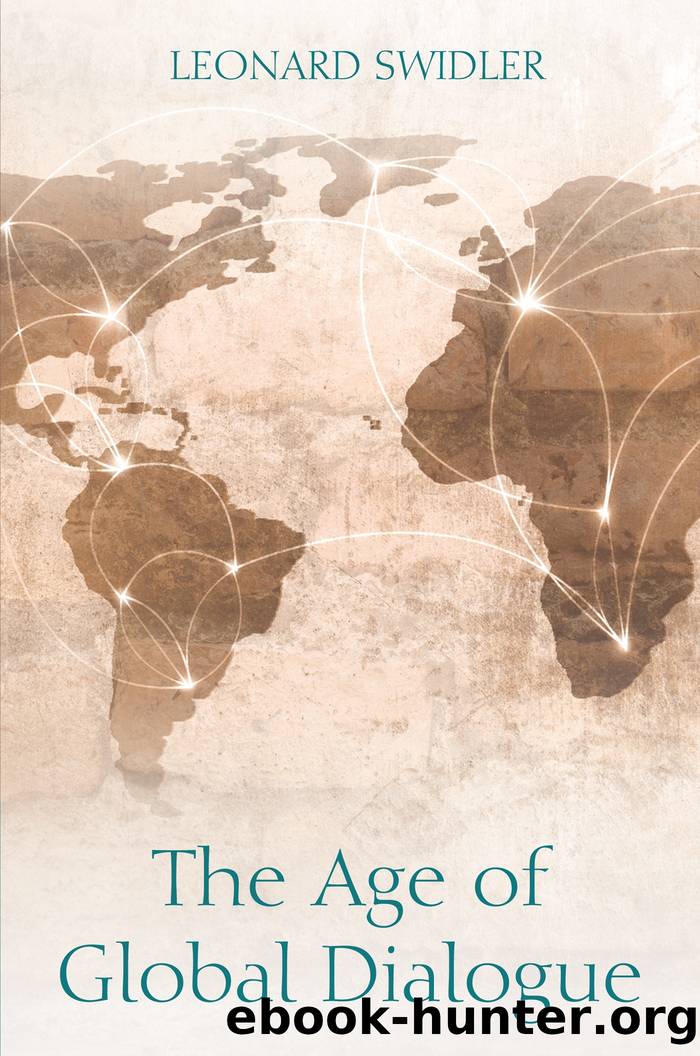The Age of Global Dialogue by Leonard Swidler

Author:Leonard Swidler [Swidler, Leonard]
Language: eng
Format: epub
Publisher: Pickwick Publications
Published: 2016-12-06T08:00:00+00:00
She is a breath of the power of God,
pure emanation of the glory of the Almighty . . .
She is a reflection of the eternal light,
untarnished mirror of God’s active power,
image of his goodness.
Although alone, she can do all;
herself unchanging, she makes all things new. (Wis 7:21–27)
In the Christian tradition the feminine figure of Wisdom, Hokmah, was in many instances assimilated in its traits into the Christ figure. Christos, as noted, is simply the Greek form of the Hebrew Meshiach, the Anointed One, but in Christian tradition it quickly took on the more far-reaching characteristics of Hokmah. This is seen perhaps most strikingly in the Prologue of John’s Gospel where the talk is about the Word, the Logos. However, it must be borne in mind that the Jewish Scriptures had already identified God’s Word (Dabar) with Wisdom (cf. Psalm 119; Sirach 24:1–3, 9, 23, and Wis 9:1–2), and many Christian Scripture scholars today suggest that in this Prologue Logos was simply substituted for Hokmah/Sophia in a previously existing hymn to Wisdom.307 The text reads: “In the beginning was the Word (Hokmah), and the Word was with God (Yahweh), and the Word (Hokmah) was God. He (She) was with God in the beginning. Everything was made through him (her), and without him (her) no existing thing came into existence. In him (her) was life, and the life was the light of humans” (John 1:1–4). Thus, in the Christian tradition Christos and Logos are very like the Hebraic figure Hokmah, that is, the creative aspect of God, God ad extra, and both are like the Hindu Shakti and, even more prominently (as will be discussed below), the masculine Lord, Ishvara.
Ultimate Reality is not only variously named, but also variously conceived, both West and East. Although the proper Hebraic name for Ultimate Reality, Yahweh (which was long understood to mean, “I am who I am,” as the Latin Vulgate translates it, but now is usually thought to be better understood as something like the more dynamic, “I will be who I will be”), does seem largely to describe divinity in se, the Bible and most subsequent Jewish and Christian writings speak almost exclusively of God ad extra. Not so in Hinduism. The preferred term there for Ultimate Reality is Brahman (occasionally referred to as Atman), which is not exactly divinity in se, but at times is understood in a way close to that concept. In that case it is Brahman without attributes, Nirguna Brahman, as opposed to Brahman with attributes, Saguna Brahman (this latter being largely identified with the Lord, Ishvara). In any case, Brahman is not thought of as personal but, rather, like the Ground of Being—pure potency, in Aristotelean terms (quite the opposite of God in the West, who would be thought of rather as pure actuality). This contrasts with the Judeo-Christian understanding of divinity as personal. Hence, the Greek term “Theos” (related to the Latin “Deus,” both of which are rendered in English as “God”), including as it does the notion of personal divinity, leads to the concept of theism as affirming a personal God.
Download
This site does not store any files on its server. We only index and link to content provided by other sites. Please contact the content providers to delete copyright contents if any and email us, we'll remove relevant links or contents immediately.
The Lost Art of Listening by Michael P. Nichols(6465)
Why I Am Not A Calvinist by Dr. Peter S. Ruckman(3767)
The Rosicrucians by Christopher McIntosh(3047)
Wicca: a guide for the solitary practitioner by Scott Cunningham(2703)
Signature in the Cell: DNA and the Evidence for Intelligent Design by Stephen C. Meyer(2497)
Real Sex by Lauren F. Winner(2467)
The Holy Spirit by Billy Graham(2409)
To Light a Sacred Flame by Silver RavenWolf(2351)
The End of Faith by Sam Harris(2282)
The Gnostic Gospels by Pagels Elaine(2023)
Nine Parts of Desire by Geraldine Brooks(2002)
Waking Up by Sam Harris(1954)
Heavens on Earth by Michael Shermer(1951)
Devil, The by Almond Philip C(1897)
Jesus by Paul Johnson(1882)
The God delusion by Richard Dawkins(1843)
Kundalini by Gopi Krishna(1822)
Chosen by God by R. C. Sproul(1755)
The Nature of Consciousness by Rupert Spira(1688)
